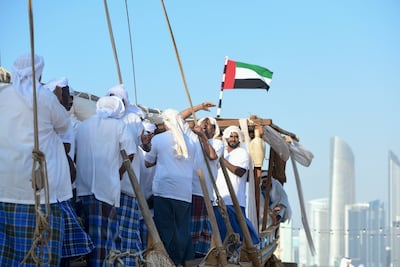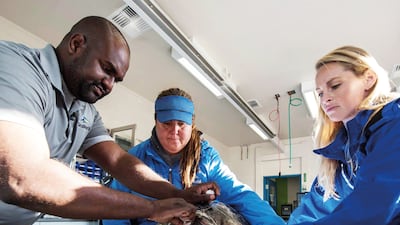We cannot protect what we do not know.
As a child, many of my favourite moments involved the sea and animals. From swimming at the beach, going out on the boat, being amazed by the abundant animals and the diverse marine life in our oceans, or simply listening to our elders’ experiences of pearl diving – we grew up with love, respect and awe for the sea and its bounty.
Conservation, in those days and for our fathers and forefathers, was not a distinct concept – it was integral to life. Our elders knew instinctively to care for the sea and its abundance because its health affected our health. They understood the diversity of the sea, its seasons and currents, understood the life cycle and uniqueness of each of its creatures, and practised sustainability long before the term came into use. That knowledge became the foundation of our lifelong attitudes towards the sea, and fuelled Abu Dhabi and the UAE’s long-standing marine conservation and environmental protection work.
Three quarters of our planet are covered by ocean, which provide food, energy and water. They provide a home for millions of animal species – hundreds of thousands of which have yet to be identified – and absorbs about a quarter of the world’s annual carbon dioxide emissions, thereby mitigating climate change and alleviating its affects.
We might not be able to see all the life below the water’s surface, but preserving our oceans is one of the most significant environmental challenges we face today. So much so, that number 14 of the UN’s Sustainable Development Goals is focused on conserving and suitably using the oceans, seas and marine resources.

Aligned with Today for Tomorrow – the UAE Year of Sustainability’s theme – I’m very proud to say that we recently opened the SeaWorld Research and Rescue centre on Abu Dhabi’s Yas Island, the first dedicated marine research, rescue, rehabilitation and return facility in the region.
This is a cornerstone in the emirate’s journey of education and conservation, and will inspire the next generation of marine scientists to learn more about Abu Dhabi’s long-term vision for protecting our marine wildlife and their habitats. Together with SeaWorld, we will be pushing the limits of science and conservation to become the foremost knowledge hub for marine scientists, not only in the UAE, but also in the wider region.
The centre will conduct a range of programmes, serving as an integrated and advanced marine science knowledge hub and an important contributor to marine conservation in the UAE and the wider region. Its efforts will aim to improve the public’s knowledge of and commitment to the conservation of the region’s marine wildlife, habitats and ecosystems, using the experience and knowledge gained from SeaWorld’s almost 60 years of marine research.
Complementing these efforts, the next-generation marine life theme park SeaWorld Yas Island, Abu Dhabi will open its doors on May 23. The park will also play a key role in promoting environmental awareness and protecting marine life in Abu Dhabi, the UAE and the region telling a captivating story that uncovers the interconnectivity between life on Earth and our oceans. SeaWorld Abu Dhabi will deliver fun, engaging and immersive family friendly experiences through eight uniquely themed realms, featuring exciting rides, up-close animal encounters and inspiring programmes.
The park is designed to accelerate understanding, respect and awe for the marine world among our young people and our peers by showing them what is there in the sea, helping them to understand its uniqueness and importance, and cultivating a desire to care for it.
We want to tap into every child’s natural curiosity and affinity for animals of all shapes and sizes and use these to encourage the values of conservation from a young age. We want to inspire visitors of all ages and nations with the fragile beauty of the world’s seas and oceans as well as their interconnectedness with our well-being because we will be motivated to protect something only when we know how important and unique it is.
We have a long-standing commitment to contribute to our nation’s economic diversification and growth, and with SeaWorld Abu Dhabi we will be creating thousands of jobs in different fields, providing opportunities for UAE citizens to become marine scientists and experts, as well as adding an unprecedented marine-life park to our country and region. The tremendous economic impact of attractions like SeaWorld Abu Dhabi is well documented worldwide.
With the opening being less than a month away, we are well on our way to achieving all these things.
Even though decades have passed since I was a young boy chasing hermit crabs and swimming in the shallows, I still get that same sense of excitement seeing the world-class SeaWorld Abu Dhabi complex take shape around us. As our oceans continue to support the global population’s economic, social and environmental needs, these conservation efforts provide an opportunity to chart a sustainable recovery path for decades to come in harmony with the natural environment.
All of us at Miral, myself included, are blessed to be involved with this transformative, impactful endeavour that combines entertainment and education into an unforgettable experience that has the power to shape minds, lives and our world.


